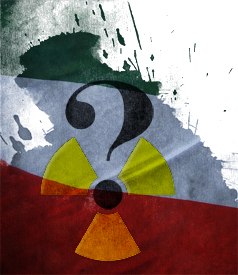Support justice-driven, accurate and transparent news — make a quick donation to Truthout today!
Few issues in international affairs are so unquestioningly accepted as the notion that a nuclear-armed Iran would wreak havoc on the world.
But history does not support the inevitability of such a doomsday scenario.
Some countries have actually been persuaded to give up their nuclear weapons. Their choices illuminate what steps the United States can take to convince Iran to forgo nuclear weapons.
South Africa
In the 1980’s, the South African apartheid regime feared for its existence. It was paranoid about anti-apartheid insurrection as well as the hostile – sometimes Marxist – inclinations of its neighbors. The international opprobrium South Africa experienced due to apartheid made its unease even worse.
The regime concluded that only a nuclear deterrent could guarantee its security, and it developed a small nuclear arsenal. But just before the end of apartheid, the regime dismantled all of its nuclear weapons.
The end of the cold war enabled the disarmament decision because it removed the specter of “total onslaught” that had petrified the apartheid regime. But above all, the regime perceived that nuclear weapons were jeopardizing South Africa’s strategic objective: re-integration with the Western alliance.
Breakup of the Soviet Union
When the Soviet Union dissolved, Belarus, Kazakhstan and Ukraine inherited nuclear weapons. They all decided to return these weapons to Russia.
Belarus
Friendly Belarus-Russia relations facilitated the return of Belarus’ nuclear weapons, as did popular Belarussian distaste for all things nuclear due to the devastating crossborder fallout from the Chernobyl disaster. More strategically, the government feared that a nuclear-armed Belarus would be targeted if hostilities broke out between the North Atlantic Treaty Organization (NATO) and Russia. It also believed that it had to maintain a nonthreatening posture towards the US and Russia in order to ensure its own security.
Kazakhstan
Kazakhstan was initially reluctant to return its nuclear weapons because its neighborhood was dominated by nuclear-armed Russia and China. Kazakhstan feared that without nuclear weapons, it would be vulnerable to Chinese coercion about territorial disputes. These concerns were alleviated when Kazakhstan entered a mutual security arrangement with Russia and other former Soviet republics.
The Kazakh government was also seeking reassurance in a strong relationship with the US, and retaining nuclear weapons impeded such relations.
Ukraine
Do you like this? Click here to get Truthout stories sent to your inbox every day – free.
When Ukraine declared independence from the Soviet Union, it inherited the world’s third-largest nuclear arsenal. Russia perceived this inheritance as a threat and pressured Ukraine to return the weapons – a stance which convinced many Ukrainians that nuclear weapons were necessary to deter Russia.
As Ukrainian-Russian negotiations deteriorated, the US became increasingly involved in efforts to return the nuclear weapons to Russia. A sustained American commitment to Ukraine was essential, because Ukraine viewed the US as its ultimate guarantor in a post-Soviet world. In a symbolic triumph for Ukraine, Russia agreed to recognize and respect Ukrainian sovereignty, thus decreasing Ukrainian fears about Russian intentions. The US and Britain also assured Ukraine that they would not use, or threaten to use, nuclear weapons against Ukraine.
Lessons Learned
All four countries gave up their nuclear weapons in order to improve their precarious political and economic fortunes.
First, they realized that nuclear weapons undermined their security by inviting confrontation with the US and Russia. It was only after their security improved that these countries decided they no longer needed nuclear weapons. International pressure on South Africa to forgo nuclear weapons was not successful as long as its paranoia remained. Likewise, Belarus, Kazakhstan and Ukraine relinquished their nuclear weapons only when they felt secure.
Second, they recognized that nuclear weapons impeded incorporation into the international community. Perversely, it was the inability of apartheid-era South Africa to join the Western alliance that aggravated its insecurities and entrenched its determination to develop nuclear weapons. Like South Africa, the former Soviet republics gave up their nuclear weapons in exchange for international acceptance.
Third, they were motivated by the substantial economic benefits they received – largely from the US – in exchange for nuclear disarmament.
The prospect of a nuclear-armed Iran is still serious. After all, four other countries kept the nuclear weapons they surreptitiously developed. India developed nuclear weapons because it felt threatened by a nuclear-armed China. Pakistan subsequently felt threatened by a nuclear-armed India. Israel feared Arab belligerence. North Korea was intimidated by US power. These countries developed nuclear weapons not because they were irrational or apocalyptic, but because they felt vulnerable.
Address the cause, not the effect
It is clear that the more insecure a country feels, the more likely it is to develop nuclear weapons. Therefore, American policies that threaten Iran actually confirm Iranian suspicions that nuclear weapons are necessary to deter the US. This vicious cycle of distrust and animosity can be diffused only through deescalating US-Iran tensions.
Thankfully, even nuclear-armed antagonists can build trust, goodwill and cooperation. The US shifted its relations with China, for instance, from estrangement to engagement when it realized that American interests were being thwarted by its refusal to accommodate China.
It is foolish and fantastical to assume that Iran intends to unleash nuclear Armageddon. Iran’s preeminent motivation is its own insecurity. The US can change the game only if it accepts that Iranian nuclear weapons are a starting point – not an ending point – for dialogue and diplomacy.
This op-ed is a distillation of a commissioned research paper for the International Commission on Nuclear Non-proliferation and Disarmament, entitled, “Giving up the Bomb: Motivations and Incentives.”
Media that fights fascism
Truthout is funded almost entirely by readers — that’s why we can speak truth to power and cut against the mainstream narrative. But independent journalists at Truthout face mounting political repression under Trump.
We rely on your support to survive McCarthyist censorship. Please make a tax-deductible one-time or monthly donation.
